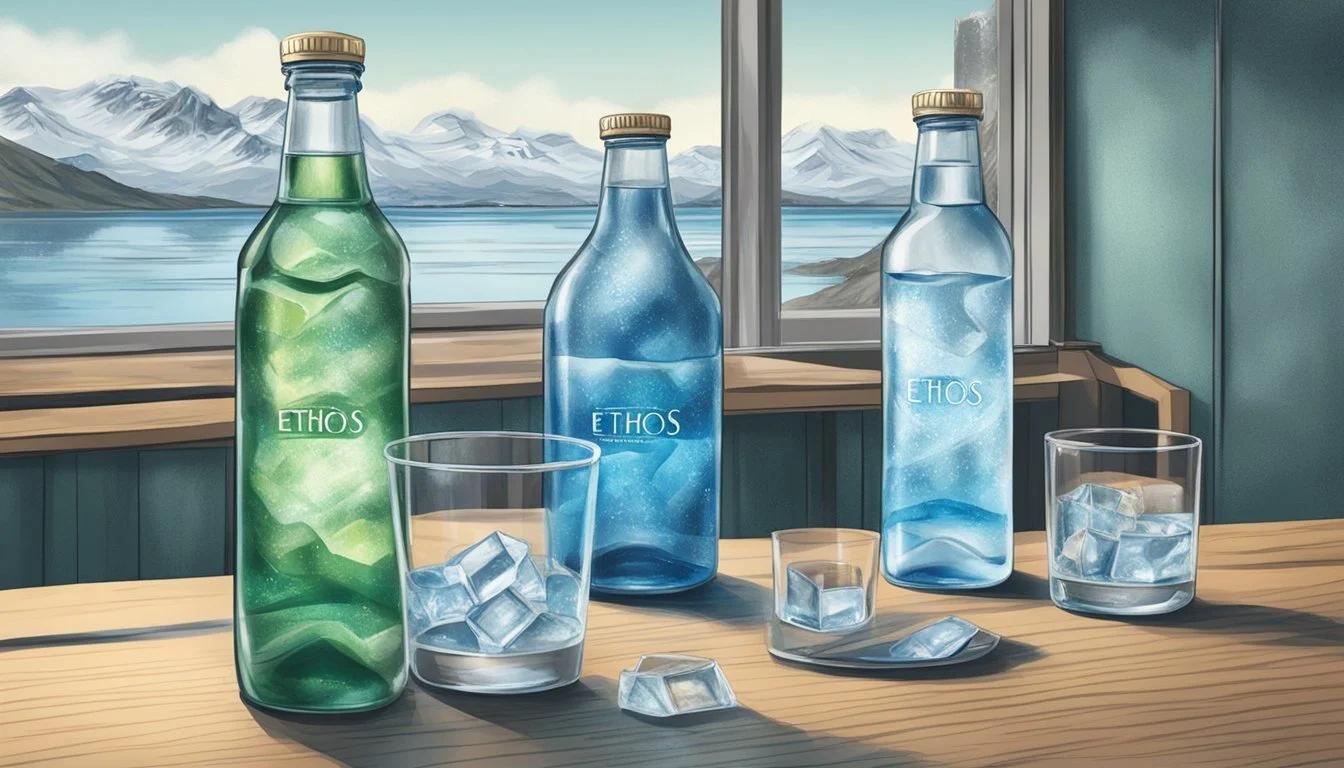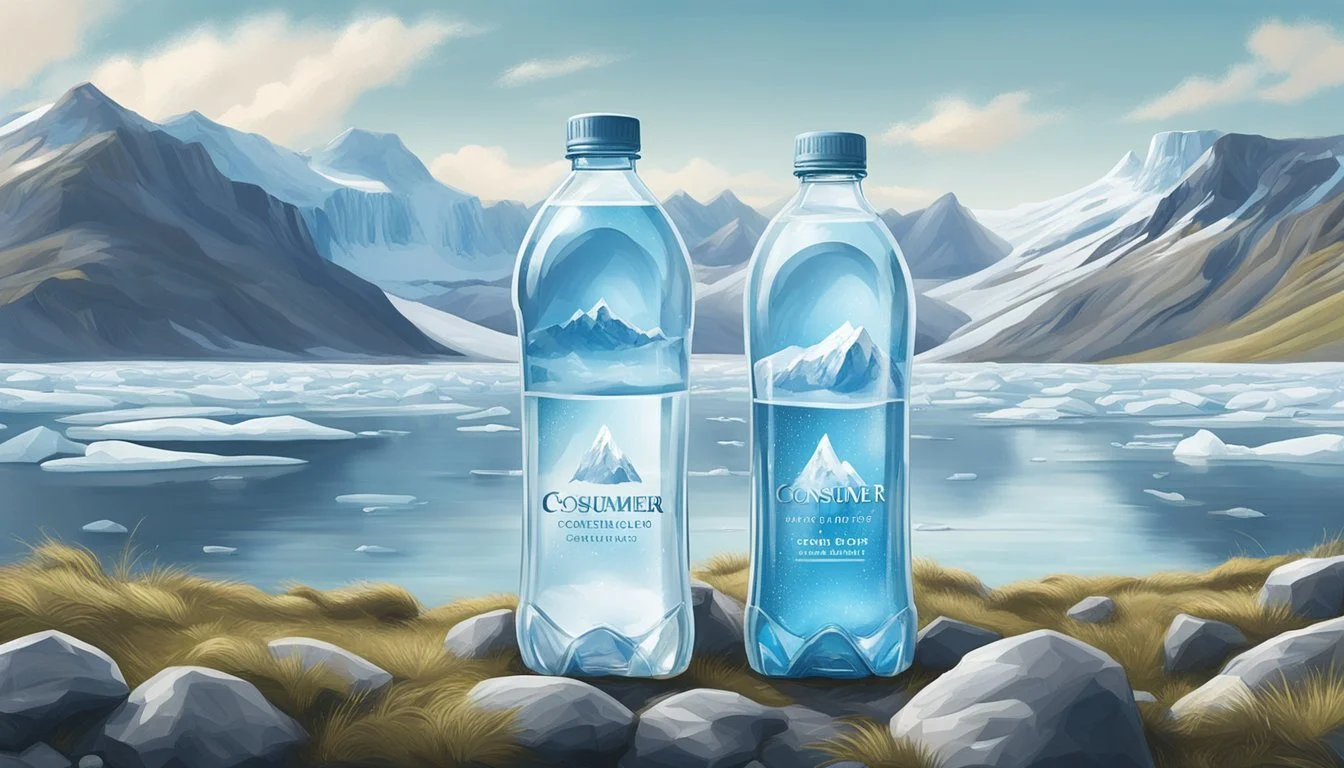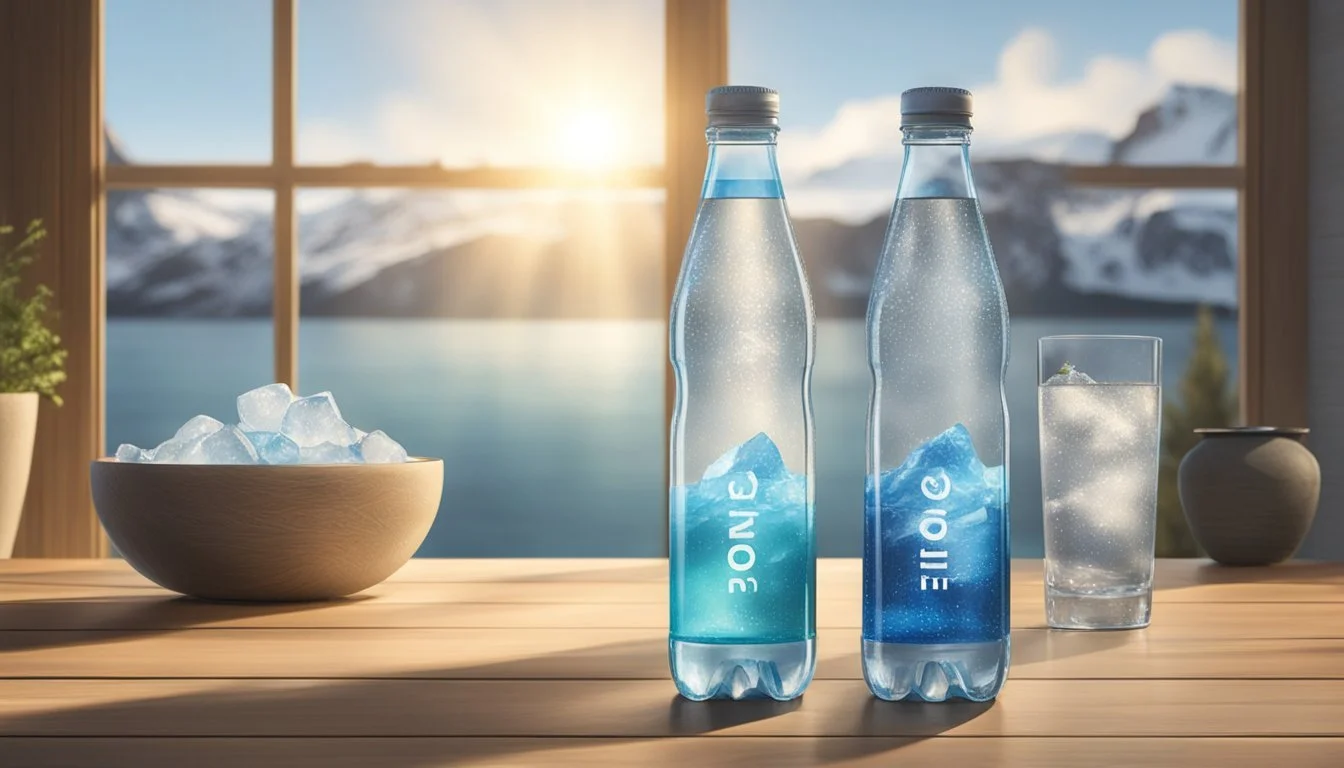Ethos vs. Icelandic Glacial
The Ultimate Bottled Water Showdown
In the world of bottled water, two brands often capture consumers' attention for their distinct characteristics and sources: Ethos and Icelandic Glacial. Ethos Water, founded with a mission to help children get clean water, is a socially-conscious brand that donates a portion of its profits to water development programs. Icelandic Glacial, on the other hand, is known for its purity and sustainability, boasting water sourced directly from Iceland's legendary Ölfus Spring, one of the world's most pristine ecosystems.
As consumers become more conscious about the environmental impact and ethical implications of their purchases, choosing between bottled water brands is no longer just about taste or price. Factors such as water source sustainability, brand ethos, and the quality of water are increasingly guiding purchasing decisions. Both Ethos Water and Icelandic Glacial present strong cases in these areas; however, they cater to different consumer values and preferences in the bottled water market.
The comparison between Ethos and Icelandic Glacial goes beyond the surface qualities of the water; it delves into a deeper analysis of corporate responsibility, environmental impact, and consumer health benefits. While Ethos focuses on charitable contributions and social impact, Icelandic Glacial emphasizes the exceptional purity of its water and its commitment to carbon neutrality. Shoppers must consider their values when choosing which water brand aligns best with their personal beliefs and lifestyle.
Understanding Bottled Water
When examining bottled water, critical factors such as source purity, hydration benefits, and environmental impact distinguish different brands and varieties.
Source and Purity
The origin of bottled water can significantly influence its purity and mineral content. Brands like Icelandic Glacial boast a source from Icelandic springs, where water naturally filters through volcanic lava rock, imbuing it with a unique mineral balance. Such natural filtration can remove contaminants while adding beneficial minerals. Conversely, Essentia water undergoes a reverse osmosis process to remove impurities from the water source before enhancing it with added minerals for optimal pH balance.
Total Dissolved Solids (TDS): May indicate the presence of minerals and varies between brands.
Icelandic Glacial: TDS around 62 mg/l.
Essential: TDS adjusted during the purification cycle.
Hydration and Health Benefits
Hydration is a core benefit of bottled water, with some brands offering enhanced mineral content for purported health advantages. Alkaline waters, such as those from natural springs in Iceland, naturally have a high pH which some suggest can help balance the body's acidity. It is important to note health benefits aside from basic hydration are not universally agreed upon and should not be overstated.
Alkaline Water: Typically has a pH above 7; Icelandic Glacial reports a natural pH of 8.4.
Environmental Impact
The water industry faces scrutiny for its environmental footprint. Sustainability efforts vary among companies, with Icelandic Glacial marketing itself as the world's first carbon-neutral water brand. Factors like bottling materials, sourcing methods, and the production process play critical roles in determining the sustainability of bottled water.
Environmental Measures:
Carbon neutral certification: Indicates efforts to offset carbon emissions.
Packaging: Choices impact recyclability and ecological footprint.
Ethos Water
Ethos Water stands as a distinctive brand known for its commitment to social responsibility with a history of being associated with Starbucks. This section synthesizes important facets of Ethos Water, including its inception, product offerings, and social initiatives.
Brand History
Ethos Water, conceived as a socially responsible brand, was founded in 2002 with the mission to help provide children around the world with access to clean water. In 2005, Starbucks acquired Ethos Water, significantly enlarging its distribution footprint. As part of the esteemed portfolio of brands owned by Starbucks, Ethos Water operates under the Starbucks subsidiary, which is itself part of the larger Coca-Cola distribution network.
Product Range
The brand offers a range of bottled water products that emphasize purity and sustainability. Ethos Water's products are known to be BPA-free and are packaged in 100% recyclable materials, aligning with contemporary environmental expectations. The focus of the brand extends to ensuring a sustainable lifecycle for their packaging, which supports the larger sustainability goals in the beverage industry.
Bottled Water: Ethos primarily offers purified water, distinguished by its cleanliness and taste.
Packaging: Commitment to environmental stewardship is evident in their use of recyclable materials.
Social Responsibility
Ethos Water's social initiative is rooted in its pledge to donate a portion of its profits to support water, sanitation, and hygiene education programs in developing countries. This embodies the brand's dedication to social responsibility. Ethos Water announced that they aim to be carbon neutral and have substantially invested in sustainability practices to reduce their overall environmental impact. A notable point is the partnership with Starbucks, which underscores the brand's extensive reach and potential for effecting positive change through corporate social responsibility programs.
Charitable Contributions: For each bottle sold, a contribution is made to support water projects.
Sustainability Goals: Ethos Water is proactive in its endeavors to minimize its carbon footprint and maintain environmentally friendly practices.
Icelandic Glacial Water
Icelandic Glacial Water boasts of being one of the purest waters globally, sourced from Iceland's legendary Ölfus Spring. Known for its high pH level and commitment to environmental sustainability, this brand offers more than mere hydration.
Iceland's Unique Ecosystem
Iceland's geography plays a pivotal role in the purity of Icelandic Glacial Water. The Ölfus Spring is replenished by rain, snow, and ice melt from nearby mountains, filtered through layers of volcanic rock. This natural filtration process not only safeguards the water from pollution but also enriches it with a unique mineral balance.
Location: Ölfus Spring, Iceland
Influences: Volcanic rock filtration
Result: Natural purity and mineralization
Water Quality and Features
Icelandic Glacial Water is recognized for its alkaline pH level, typically around 8.4. A balanced pH is often sought after for its touted health benefits, including balancing the body's acidity. The water is bottled directly at the source in the Ölfus Spring, ensuring that no unwanted chemicals contaminate the pristine water.
pH Level: Approximately 8.4
Bottling: At the source to maintain purity
Container Options: PET and recyclable glass bottle options
Brand Commitments
The company maintains a strong commitment to the environment, claiming to be the world's first carbon-neutral bottled water brand. This status is achieved through various initiatives such as sustainable packaging and operating practices. Furthermore, following volcanic eruptions, Icelandic Glacial has leveraged the renewed purity of the spring, ensuring that its water remains free from modern-day contaminants.
Environmental Initiatives: Carbon neutrality, sustainable packaging
Response to Natural Events: Utilizes post-volcanic eruption purification
Competitive Positioning: Rivals brands such as Glaceau Smart, offering a distinct glass bottle experience
Icelandic Glacial Water sets itself apart with its purity and environmental ethos, emerging as a premium alternative in the bottled water market.
Taste and Texture Analysis
In comparing Ethos and Icelandic Glacial bottled water, both taste and texture play significant roles. This section dissects the flavor profiles of each brand and contrasts their mouthfeel to aid consumers in discerning their preferred choice.
Flavor Profiles
Ethos water flavor typically exhibits a clean and neutral taste, which it achieves through a multi-step purification process that includes reverse osmosis. The purification strips the water of most of its natural minerals and electrolytes, though Ethos does add back a unique blend of minerals for taste.
On the other hand, Icelandic Glacial has a slightly more complex flavor profile. It’s known for its high alkaline pH level, which can result in a smoother taste. The minerals it acquires naturally from filtering through Iceland's volcanic rock—such as calcium, magnesium, and silica—contribute to its distinctive taste.
Mouthfeel Comparison
Comparing mouthfeel, Ethos water is characterized by its purity and tends to have a soft texture. The lack of significant mineral content intricately alters the way the water feels in the mouth, often leading to a light and clean sensation upon drinking.
Icelandic Glacial, with its mineral and electrolyte content, has a more pronounced mouthfeel. The water's interaction with volcanic rock not only enriches it with minerals but also gives it a characteristic silky texture that distinguishes it from many other bottled waters.
The text above details specific sensory aspects of Ethos and Icelandic Glacial bottled waters—focusing strictly on flavor profiles and mouthfeel—and does not claim superiority of one over the other. The section aims to inform by highlighting inherent qualities inherent in each brand based on their unique sourcing and processing methods.
Health and Wellness
When it comes to bottled water, consumers often consider health and wellness benefits as a primary factor. Ethos and Icelandic Glacial waters are both known for their unique properties that may contribute to overall health, including pH levels, mineral content, and hydration effectiveness, especially when it comes to physical activities such as workouts.
pH Levels and Alkalinity
Ethos water is marketed as having a balanced pH, typically close to neutral. However, Icelandic Glacial water is renowned for its high alkalinity, boasting a pH level of 8.4. Alkaline water, which is less acidic than tap water, is believed by some to help neutralize acid in the bloodstream, contributing to improved metabolism and increased energy.
Mineral Content
Minerals are essential for the proper functioning of the body, and both bottled water brands offer beneficial minerals. Icelandic Glacial water is naturally filtered through volcanic rock, which imbues it with electrolytes and minerals like calcium, magnesium, and potassium. These minerals are important for bone health, muscle function, and overall cellular processes. Ethos water, while also containing various minerals, does not specify its mineral content as a prominent feature.
Mineral Icelandic Glacial Ethos Calcium Present Unspecified Magnesium Present Unspecified Potassium Present Unspecified
Hydration for Workouts
Proper hydration is crucial during workouts, and both Ethos and Icelandic Glacial water can be sufficient. However, the electrolyte content can be a determining factor for many consumers. Icelandic Glacial with its natural electrolytes can be especially beneficial for those needing to replenish minerals lost through sweat. These electrolytes help maintain fluid balance and support nerve and muscle function. Ethos water provides hydration, but it does not promote itself as being "supercharged" with electrolytes, which might be a plus for intense workout sessions.
Both brands provide hydration, but Icelandic Glacial's mineral-rich and higher pH level water might offer an extra edge for health and wellness, particularly for consumers who are focused on physical fitness and looking for water that can support vigorous workouts.
Comparing Environmental Sustainability
When scrutinizing Ethos and Icelandic Glacial bottled water brands, their sustainable practices, particularly regarding carbon footprint and packaging, become focal points for environmental comparison.
Carbon Footprint
Ethos Water pledges to help children get clean water; however, specific carbon offset details are less prominent. The company does not clearly state if they have a CarbonNeutral certification, indicating the need for more transparency in their carbon footprint reduction efforts.
Icelandic Glacial, on the other hand, boldly markets itself as the world's first CarbonNeutral certified bottled water. The brand achieves this through dedicated use of geothermal and hydroelectric power, ensuring their operation has a minimal environmental impact.
Recycling and Packaging
Both companies assert environmental conscientiousness through their packaging choices:
Ethos Water uses 100% recyclable bottles, though it's important to note that their bottles are made of plastic and recycling rates can vary widely by region.
Icelandic Glacial also boasts 100% recyclable packaging and takes it a step further by ensuring their bottles are BPA-free, shielding consumers from potential chemical exposure.
Neither brand currently offers boxed water, a more sustainable packaging option that has been growing in popularity due to its lower carbon footprint and better recycling rate.
Pricing and Availability
When considering bottled water brands like Ethos and Icelandic Glacial, consumers often evaluate affordability and the extent of global distribution. These factors can greatly influence purchasing decisions.
Affordability
Ethos Water, known for its charitable contributions to global water programs, tends to be priced higher than average bottled water due to its social mission. A portion of its sales goes towards clean water initiatives. In contrast, Icelandic Glacial is recognized for its premium source and quality, which may also command a higher price point. However, their pricing is competitive compared to other high-end water brands such as Fiji Water.
Ethos Water (500ml): Typically ranges from $1.50 - $2.00
Icelandic Glacial (500ml): Often found between $2.00 - $2.50
Compared to more commonly distributed and cost-effective brands like Nestlé Pure Life or Poland Spring, both Ethos and Icelandic Glacial fall into the premium category.
Global Distribution
Icelandic Glacial boasts a strong distribution network, benefiting from Iceland's naturally renewing water sources. They have managed to establish a notable presence in various countries, often found in major supermarkets and health food stores. Coca-Cola distributes Ethos Water mainly in North America, particularly accessible in Starbucks locations, leveraging the coffee giant's extensive reach.
For the availability of each brand:
Ethos Water: Predominantly available in the United States.
Icelandic Glacial: Widely available across North America, Europe, and other select international markets.
Despite the global reach of companies like Nestlé Waters with brands such as Pure Life, Poland Spring, and Deer Park, Ethos and Icelandic Glacial maintain their own through focused distribution strategies. Ethos Water's availability remains more limited due to its exclusive distribution partnership, while Icelandic Glacial pursues broader market availability.
Consumer Perception and Brand Reputation
Consumer perception and brand reputation are critical factors that significantly impact the success of bottled water brands. Ethos and Icelandic Glacial have developed distinct reputations based on quality, taste, and their environmental initiatives.
Consumer Reviews
Consumers often examine both Ethos and Icelandic Glacial on the basis of taste and commitment to sustainability. Ethos, primarily distributed at Starbucks, is often praised for its initiative where a portion of each sale supports global water programs. However, some consumers question the justification of its higher price point when compared to typical municipal water. In contrast, Icelandic Glacial enjoys accolades for its purity and unique origin from natural springs in Iceland, usually ranked high for its clean and fresh taste.
Ethos Water: Higher cost, socially responsible initiatives
Icelandic Glacial: Pristine source, premium taste, environmental focus
Awards and Recognitions
Both brands bolster their standing with various certifications and awards recognizing their quality and environmental efforts. Icelandic Glacial has been awarded for its eco-friendly bottling and carbon-neutral operations. Moreover, Ethos and Icelandic Glacial are recognized for sourcing from natural springs and ensuring the consistent quality of their still and sparkling waters. Such recognitions validate their efforts in providing premium bottled water while maintaining a sustainable approach.
Icelandic Glacial: CarbonNeutral® product and operation certifications
Ethos Water: Commendations for social initiatives
Final Verdict and Recommendations
When deciding between Ethos and Icelandic Glacial bottled waters, consumers should consider quality, environmental impact, and overall brand performance relative to their personal preferences and values.
Best Choice for Quality
In terms of water quality, Icelandic Glacial boasts a naturally high pH level of 8.4 and relatively low total dissolved solids (TDS) at 62 mg/l. This reflects a fresh taste without a hint of plastic or metallic flavors. Ethos Water, while providing clean drinking water, may not match Icelandic Glacial's natural purity and balanced mineral content, as it doesn't emphasize its TDS or pH level in the same manner.
Most Eco-Friendly Option
When evaluating sustainability, Icelandic Glacial's commitment to the environment stands out. They use 100% recyclable rPET bottles, and their source—a replenishing spring in Iceland—is touted for its eco-conscious extraction. Ethos Water, under the Starbucks brand, contributes to global water access initiatives, but may lack similarly strong eco-packaging commitments.
Overall Winner
Icelandic Glacial emerges as the top contender in this comparison. It outperforms Ethos Water on the essential attributes of water quality and environmental stewardship. While Ethos Water supports commendable social causes, for consumers prioritizing the actual product attributes—including origin, refinement process, and sustainability—Icelandic Glacial holds the edge. However, consumers may still choose Ethos for its philanthropic efforts, especially if they weigh ethical considerations as heavily as product characteristics.









